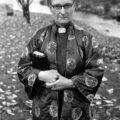
By: Trisha Bleau (Smith)
Time Frame:
second century – during the rule of Emperor Marcus Aurelius
(???-177)
Quote:
“I am a Christian; no wickedness is carried on by us!” or another translation is “I am a Christian and we commit no wrongdoing.”
This was in response to the torturers who were at a loss as to what more they could do to torture her further.
Family:
unknown
Job:
slave
Introduction:
The lives of those in the early first and second century may seem distant and irrelevant to the Christians of today. But there is much we can learn from these first Christians and the faith they had. They faced great persecution, unlike any most of us today have faced. Could you have stood up for your faith as characters such as Blandina did? Learn more about Blandina through this short feature.
Lesson:
The early Christians faced many horrible crimes against them. Persecution was not uncommon, and none knew it better than the Christians of the second century when Blandina, our featured female of faith, lived.
The persecution the early Christians faced are almost inconceivable. They were restrained in the worst areas of the prisons, where many died of starvation, disease, suffocation, etc. Some were placed in stocks; others were placed in a hot-iron seat where their flesh was burned. Others were tossed to the beasts and ripped to shreds.
Blandina was among the Christians who faced torture that led to death. She became a martyr for Christ and one that inspired and encouraged other Christians to live their faith openly and courageously.
She was among those arrested in the early second century when Marcus Aurelius was in power. Her master was also arrested at this time for being a Christian.
Though she had already endured tortures beyond belief and was treated with inhumane brutality, she was yet to face the worst. Her tortured body was placed on a stake and used to taunt the wild beasts. Her torture, though designed to scare the Christians in to recanting their faith, had the opposite effect. It inspired them, reminding them of Christ on the cross. Though she was used as bait for the beasts her body was not ravaged by them. Not one of the beasts attacked her. So she was taken down from the stake and cast into prison yet again.
Death still came to her despite her earlier escapes from torture. Blandina faced death heroically, as is recorded by a source:
“On the last day of the contests in the amphitheater, Blandina was again brought in with Ponticus, a boy of about 15. Every day they had been brought to witness the sufferings of others and pressed to deny their faith and swear by idols. Ponticus died first, and Blandina remained the last. She had encouraged many others and saw them go on before her to Jesus. Now she was ready to hasten after them. She faced her death rejoicing-as if being called to a marriage feast rather than wild beasts. The report stated: After the scourging, after the wild beasts, after the roasting seat, she was finally enclosed in a net, and thrown before a bull. And having been tossed about by the animal, but feeling none of the things which were happening to her, on account of her hope and firm hold upon what had been entrusted to her, and her communion with Christ, she also was sacrificed. After the bodies of the witnesses were exposed for six days, they were burned to ashes and thrown into the Rhone river. The bodies of those who had suffocated in prison were thrown to the dogs, and guards were stationed to prevent the remaining Christians from burying them. The pagans hoped to prevent even the hope of resurrection for the Christians.”
Another source, an ancient letter, recorded the persecution in Lyons. It was included in the Ecclesiastical History of Eusebius and stated:
“While we were all trembling, and her earthly mistress, who was herself one of the contending martyrs, was apprehensive, lest, through the weakness of the flesh, she should not be able to make a bold confession, Blandina was filled with such power, that her ingenious tormentors, who relieved and succeeded each other from morning till night, confessed that they were overcome and had nothing more that they could inflict upon her. They were amazed that she continued to breathe after her whole body was pierced and torn asunder. In the midst of her sufferings, as she for a moment revived, she repeatedly exclaimed, ‘I am a Christian; no wickedness is carried on by us!'”
Blandina’s faith has inspired many. Her death was not for naught – it was memorialized by a marker at the amphitheater in which she died with other Christians. Her faith is celebrated June 2 of each year by the Catholic church, made a saint and remembered. Relics are kept in the church of Saint-Leu, Amiens, France, though whether these are truly relics or simply something that is attributed to this woman of faith is unknown.





Be the first to comment